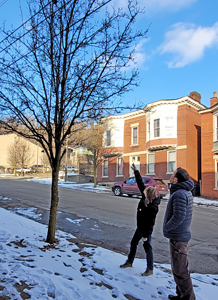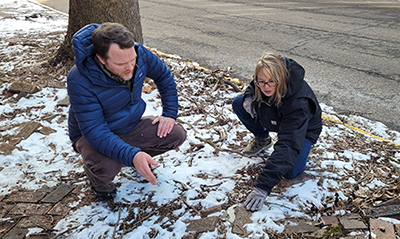
WEST LIBERTY, W. Va., January 26, 2025 – Green spaces in the City of Wheeling are set to benefit from a $1.5 million Urban and Community Forestry Grant recently awarded as part of a partnership between West Liberty University (WLU) and the West Virginia University (WVU) Extension Service.

Falling under the Inflation Reduction Act, passed in 2022 in part to stimulate domestic energy production while promoting clean energy, the grant aims to establish a self-sustaining training program to create a local workforce of climbing arborists who are properly skilled in managing tree growth, disease identification, tree selection (for plantings), controlling invasive species, and urban riparian forest management.
Building on the City of Wheeling’s 2022 Urban Forest Management Plan, the grant will expand urban forestry efforts to underrepresented neighborhoods, specifically to enhance canopy cover and green spaces in South and East Wheeling. The project will allow WLU and WVU to work closely with the Wheeling Planning Office and other municipal departments to promote awareness of the health impacts of urban forests as well as the needs of those forests.
The grant will also fund one full-time Urban Ecosystem Manager position, managed by Ohio County, along with up to five paid internships for students enrolled in any West Virginia college or university. Full tuition will be provided for a West Liberty University biology graduate student who will work on assessing canopy cover and green spaces throughout Wheeling.
West Liberty University Associate Professor of Biology Dr. James Wood explains the growing need for urban forestry management as it relates to our changing climate.

“As we face longer and hotter summers, stronger storms, and the increased potential for prolonged droughts, we must look towards climate-resilient actions to help our communities adjust to these trends and events,” explains Wood. “Tree canopies can regulate temperature, while healthy stands of trees help to manage water produced by heavy downpours and even storm surges,” he adds.
Community education and outreach are other key initiatives of the grant, with a focus on emphasizing the economic value of urban forestry management, as well as raising awareness of the importance of trees in our local ecosystems and their impact on watershed management.
“Healthy mature trees and greenspaces in our neighborhoods increase property values and improve quality of life,” says Wood. “The training, education, and other resources provided by this grant will help Wheeling become even more livable and vibrant,” he adds.
WVU Extension Service agent Karen Cox elaborates on the partnership with WLU.
“I have worked with Dr. Wood on several natural resource projects, both engaging students in the community and through founding the Wheeling Creek Watershed Alliance. Our partnership on this project was a natural outgrowth of past community engagements,” Cox remarks. “Working in natural resources means believing in a better future, being extremely patient, and not giving up,” she adds.
In the coming year, the public can expect stakeholder meetings to identify priorities and guide urban forestry management projects. Focus groups of potential students, with the aid of various community outreach organizations, will be organized to help design the arborist training program. Potential employers will also be consulted to identify sought-after skills to guide curriculum development.
West Liberty University blends a small-town environment with a comprehensive college experience, fostering students’ aspirations through hands-on learning, personalized support, and unique academic programs at both undergraduate and graduate levels. Learn more at westliberty.edu.
